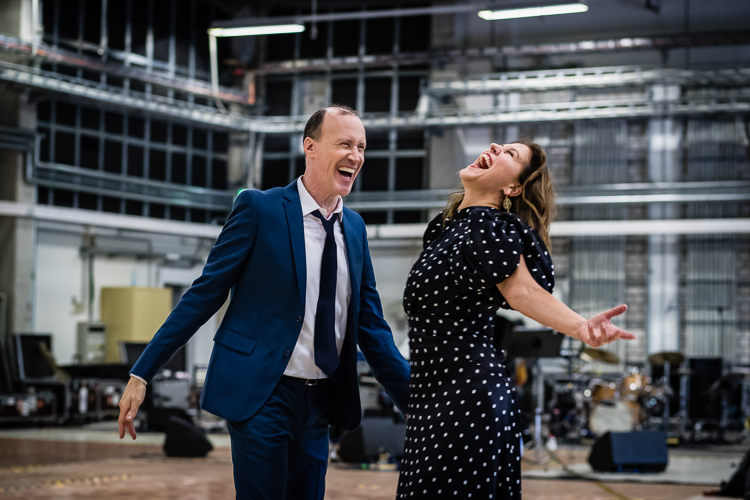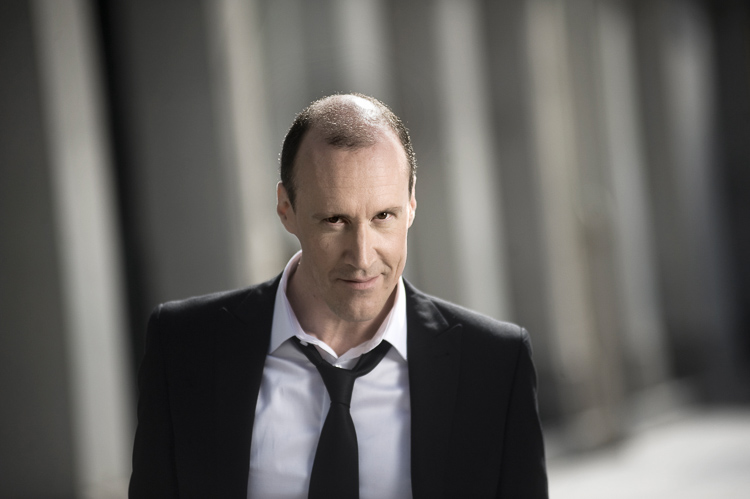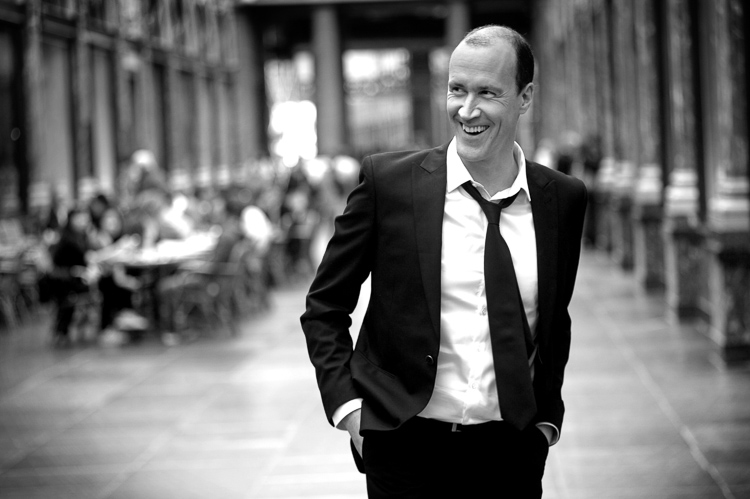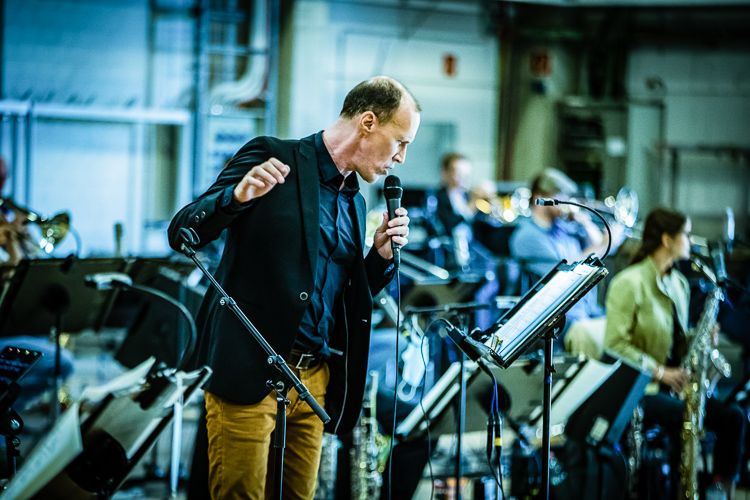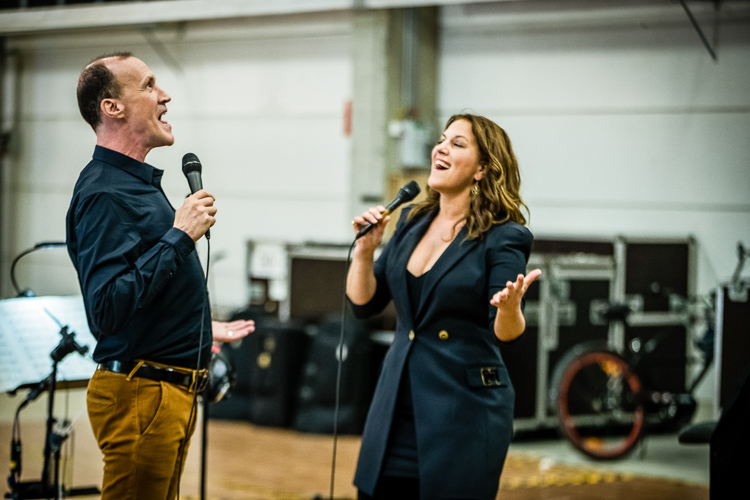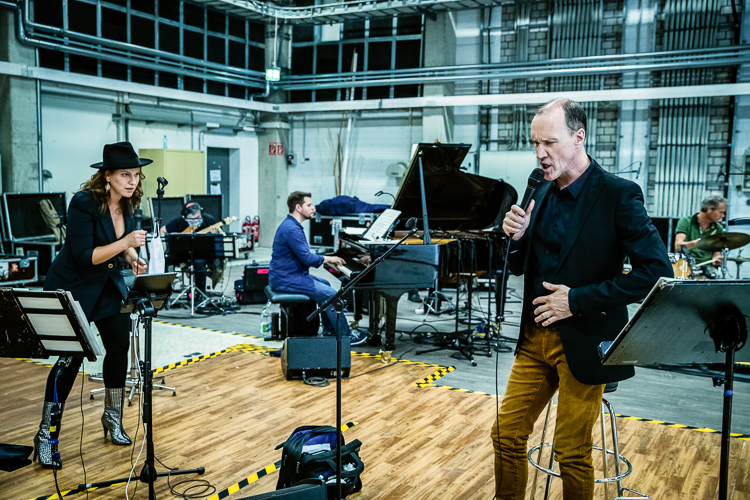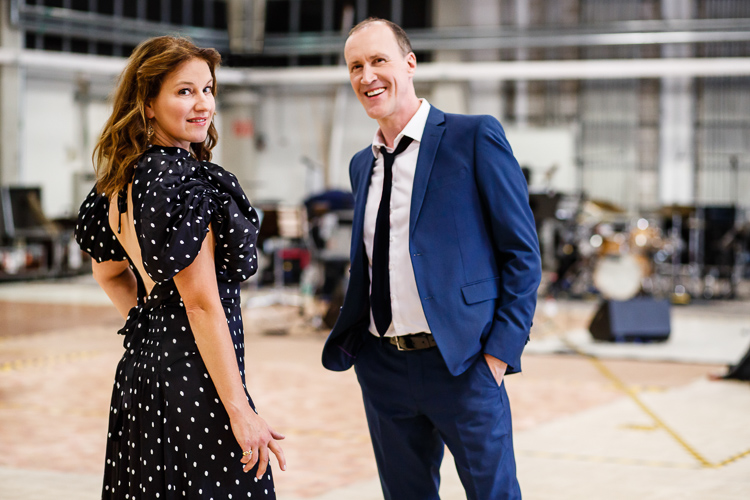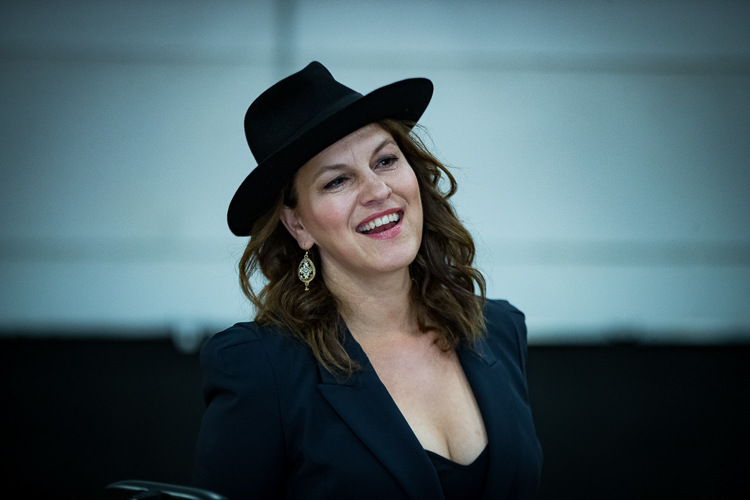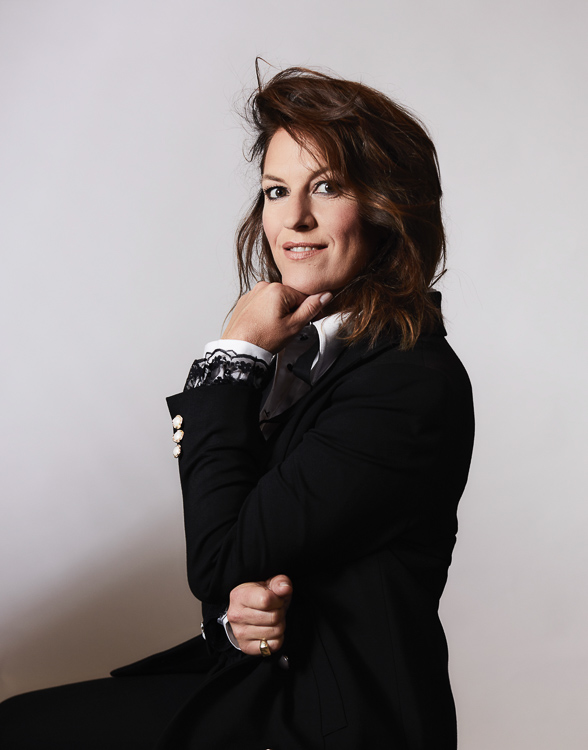AND STILL WE SING
WDR BIG BAND COLOGNE conducted by Magnus Lindgren
D 77097
listen on AppleMusic or Spotify
description
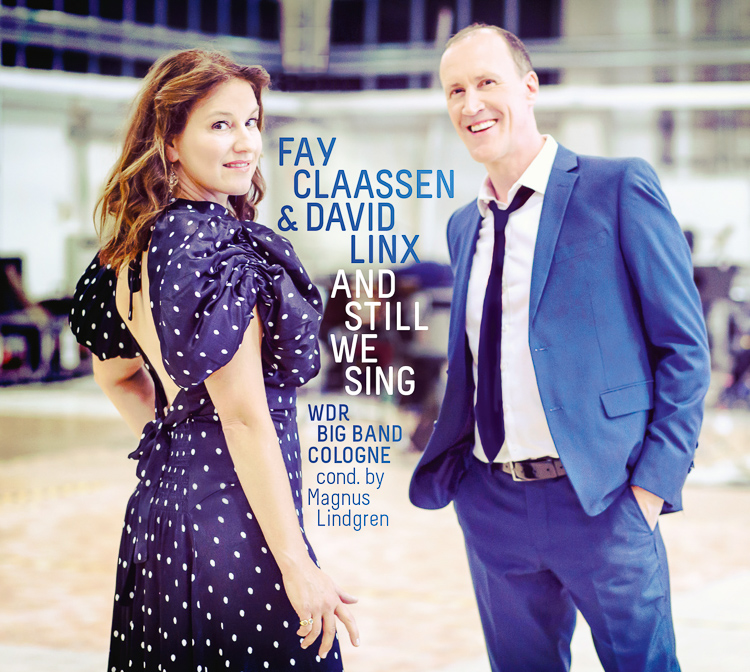
Dutch Singing Sensation Fay Claassen Joins Belgian Singer-Composer-Lyricist David Linx and the WDR Big Band Cologne on And Still We Sing
The greatest diva of the Netherlands, Fay Claassen, joins forces with gifted Belgian singer-composer-lyricist and longtime Parisian David Linx on And Still We Sing, a magnificent collaboration with the WDR Big Band, conducted by Magnus Lindgren. The title of this reunion of Claassen and Linx (they sang together on 2005’s One Heart, Three Voices) is a paraphrase of one of Maya Angelou’s most famous poems: “…And Still I Rise.” Claassen brings her crystal clear delivery and adventurous scatting chops to the program, blending beautifully and organically with Linx, a singular talent who has gained notoriety throughout Europe while still flying under the radar on the United States jazz scene. Produced by WDR tenor saxophonist (and Claassen’s husband) Paul Heller, And Still We Sing features stellar big band arrangements by Heller, Lindgren, Bob Mintzer and Michael Abene.
Claassen described the special affinity she has felt with Linx for almost 20 years. “David and I met in 2002 for the preparation of an album by the outstanding Belgium pianist/composer Ivan Paduart, who asked me to record with him. On that album, which we recorded live at the legendary Music Village in Brussels, we did a couple of David’s lyrics and songs. We immediately felt a special connection that we have with singing together. Then in 2005, David put together the One Heart, Three Voices group, a wonderful combination with his longtime musical partner, pianist/composer Diederik Wissels, and we three singers — David, Maria Pia de Vito and myself. With this group we toured for several years in France, Belgium and the Netherlands. In the same period, David and me also kept working a lot with Ivan Paduart. We did another studio album together in 2007 called In Exile Of Dreams and played a lot of European festivals for several years.”
Regarding their special alchemy together on And Still We Sing, Claassen said of her singing partner Linx, “David and me really have a special connection with singing. It’s absolutely like sister and brother twins. Every nuance that the one of us uses or goes to, the other knows it at the same time. We also have the same aesthetic/taste/feeling concerning the sound of the voice, playing with the sound of the words, timing, dynamics, shape and so on. He also always was and certainly still is a hard worker, but while making music we just want to relate on our intuition and experience, without checking out too much in advance. The great thing with musical soulmates like we are is that you can always trust one another's intuition. Also if you know each other for such a long time, the chemistry is immediately there again, even if you didn't make music together for some time.”
Their special chemistry comes to full fruition on And Still We Sing, which producer-saxophonist Heller called a triumph. “For this third album under her own name with the WDR Big Band, Fay wanted invite her longtime singer friend, her real soul brother in singing, the fantastic David Linx,” he said. “They two collaborated already years ago on a great project by David, One Heart, Three Voices, with Italian singer Maria Pia DeVito. They toured for several years in France and Belgium. So when Fay and I were brainstorming about the repertoire for this new album, I immediately had three amazing songs of David’s in my mind that they did 20 years ago on One Heart, Three Voices — ‘Sum It Up,’ ‘I Will Build Myself A Nation’ and ‘Along Goes Betty.’ Another one of my favorites of the Claassen/Linx collaboration is Ivan Paduart's ‘Waterfalls,’ also from this period. They even did them in the same keys that they did 20 years ago, which is pretty remarkable for singers, I think!”
The collection kicks off with “Sum It Up (Disturbing the Peace),” a Diederik Wissels composition with lyrics by Linx. Trombonist Andy Hunter also turns in a beautiful solo on this intriguing opener that features some tight unisons between Fay and David before the piece opens up to some spoken word recitation (aka ‘rapping’) by Linx. As he explained, “Rap is a verb and I’m amazed that a lot of young people don't know that. They think that rap is an abbreviation for ‘rhythm and poetry.’ But I think rap is basically as old as the world. To grunt is to react rhythmically to a situation. Hearing Clark Terry do his ‘Mumbles’ routine is a kind of rap. Dizzy Gillespie and Jon Hendricks can be considered as early rappers. And then there’s Gil Scott Heron. But the flow on ‘Sum It Up’ comes more from the work I did with Aka Moon or Steve Coleman when I was younger. It gave me a sense of rhythmical freedom over the pulse. So given the situation, I can always set a little flow in motion in the most unexpected of moments.”
“Along Goes Betty” is Linx’s tribute to jazz singer and scatter extraordinaire, Betty Carter. It features a lush arrangement by Lindgren, who also provides a stirring flute solo here. “I wrote and composed this song the day after Betty Carter passed away,” said Linx. “She’s one my greatest influences where it comes to singing. I met her in 1977 with (drummer) Kenny Clarke. That was the year of her legendary album, The Audience With Betty Carter, which changed my life and started to mold me as the singer I dreamt of becoming. I saw in concert as a little boy in Antwerp at the festival that my father founded, Jazz Middelheim. So when she passed, it was like another door closed. And the line in the song, ‘One door closes, along goes Betty,’ suggests that if one door closes, it allows another one to open. And it’s for us, the next generation, to become somehow the keepers of the flame.”
“Waterfalls,” by Belgian pianist-composer Ivan Paduart and with lyrics by Linx, features a glorious intertwining of vocal harmonies and wordless vocals between David and Fay. Heller also contributes a powerful Michael Brecker-inspired tenor sax solo here. Said Linx, “This is a lyric I wrote in the early 2000s and that Fay and me previously recorded in a small group setting on Ivan’s CD in 2007. The song is about how we try to make life’s experiences and feelings last until we understand we can’t force anything and that life will ultimately come to claim its due. And that true, all-encompassing love is as constant as waterfalls can be. It’s also about not trying to hold on to what you think you are or to what you think you may deserve.”
Claassen puts her stamp on her husband Heller’s easy swinging number “Good Times,” arranged by Bob Mintzer. “When Paul first played this tune for me, I immediately knew it was my song,” said Fay. “Of course, he wrote it for me, but as a singer you always have to make a real, deep connection with what you want to sing; you have to make it completely your own.” She inhabits Robin Meloy-Goldsby’s lyrics here with rare empathy while alto saxophonist Karolina Strassmeyer and tenorist Heller also deliver potent solos on this unabashed swinger. Added Heller, “I wrote this song for Fay some years ago for her birthday, wrapped it up in a big bouquet of roses and gave it to her. And on this definitive version, Fay brought that composition to life.”
Linx is showcased on “Tackle and Dabble,” composed by Dutch flutist-keyboardist Thijs van Leer, a charter member of the ‘70s rock band Focus. With new lyrics by Linx, it also features some spectacular scatting by the Belgian singer. “The greatest influence when I improvise is Miles Davis and Betty Carter,” said Linx. “Mark Murphy has left his imprint on me, but more as someone who knew how to really sing a ballad. But when it comes to vocal improvisation, it’s more Betty Carter for me. She took it to another level that surpasses scatting. So she’s always in my mind when I’m improvising. There’s even a little hint of Nusrat Fateh Ali Khan in one part of my solo when I listened back to this song. He’s in my mind as well at times when I sing.” Trumpeter Ruud Breuls also delivers a brilliant solo on this inspired number.
Michael Abene’s dramatic arrangement of Duke Ellington’s classic “In a Sentimental Mood” finds Fay soaring against his mournful, minor key accompaniment. “We kept the general harmonic structure and the melody of the original,” Fay explained. “But I wanted to have a mysterious kind of groove and an overall modal sound, and Michael came up with this vamp on the spot that is now the hook of the whole arrangement. So we resolved harmonically in minor rather than major, as in the original. And for the bridge we kept the modal idea by using the pedal points in the bass. Later on in the chart Michael takes the harmony in different directions before coming back to the mysterious modal vibe.” Johan Hörlén turns in a beautiful soprano sax solo on this unique rendering of Ellingtonia.
Claassen’s “Feel the Beat,” arranged by Heller, is an uptempo finger-popping number that features Fay and Linx in a daring simultaneous scatting interlude before they engage in some vocal fireworks with rapid-fire exchanges near the end. “Until now, this song had only been played live in concerts, mostly with my regular band,” said Fay. “Paul said when compiling the repertoire for this production that he wanted to write the swinging arrangement, which I love. It’s so great to really get loose on this one, spontaneously improvising with David, fooling around with the melody, having lots of fun!”
Their gorgeous reading of Ivan Lins’ beguiling “J’me Prépare,” with French lyrics by Linx, features an arrangement by Lindgren, who also contributes an alluring flute solo. Said David, “Toots Thielemans introduced me to Ivan Lins around 1990 and I have worked with Ivan for 30 some years now. A couple of years ago he asked me to write some French lyrics on some of his songs and this was one of them. When I adapt someone else’s lyrics, I never translate. I give myself the freedom to stray from what the original lyric is about or stay close to it if the topic is of any interest to me. ‘J’me Prépare' means ‘I’m Getting Ready,’ and that can apply to many situations in life, like love or politics. Or it can be a sudden change because of a sudden awareness of a bigger question in life, preparing oneself for what comes next. It can be heard and felt and read like a love song, but when I write lyrics I want them to work on several levels at once, so there’s always a deeper, even political twist to it between the lines.”
Linx’s Latin flavored “I Will Build Myself a Nation (Biding My Time)” is joyful shout-it-from-the-rooftops love song in 7/8 that Claassen and Linx had previously sung together on 2005’s One Heart, Three Voices. The piece builds to a heightened peak and features a brilliant piano solo by Billy Test before segueing to a poetry/rap breakdown by wordsmith Linx. They close the program on a more contemplative note with Heller’s relaxed ballad, “Rebirth,” with thoughtful lyrics by Linx. The pieces swells to a majestic sweep from the big band, culminating in a dynamic crescendo fueled by the WDR’s longtime drummer, Hans Dekker. Said composer Heller, “I played this composition of mine to David, which he immediately fell in love with
and wanted to write lyrics to. It’s always something very special for an instrumentalist and composer when a great singer and lyricist such as David takes your tune and fills it with life, love and depth.”
ABOUT THE ARTISTS
Born on Dec. 2, 1969 in Nijmegen, Netherlands, Claassen has 10 CDs under her own name, including tributes to Chet Baker, Cole Porter, the Great American Songbook and 2019’s Dutch Songbook (a live 2016 concert with the WDR Big Band). She has guested on 17 other albums, including 2011’s Standards with Bob Brookmeyer’s New Art Orchestra and interpreted pop standards by Paul Simon, Bjork, Joni Mitchell, Burt Bacharach and Paul McCartney. “She swings, but not in a forceful way,” wrote Alex Henderson of allmusic.com. “Claassen’s performances have tended to be graceful, elegant, smooth, urbane and sophisticated.”
Born on March 22, 1965 in Brussels, Linx has been a professor of vocal jazz at the Royal Conservatory of Jazz in Brussels since 1993 and a guest professor at Amsterdam Conservatory since 2010. A recipient in 2005 of the French Chevalier des Arts et des Lettres, he has worked with Billy Cobham, the Count Basie Orchestra, Toots Thielemans, Mark Murphy, Didier Lockwood, Clark Terry, Slide Hampton, André Ceccarelli and the Brussels Jazz Orchestra. He has 25 albums as a leader or co-leader, including 1990’s A Lover’s Question (his collaboration with novelist, playwright, essayist, poet and activist James Baldwin) and his most recent, 2020’s Skin in the Game. “Linx has been building an outstanding body of work for many years, distinguished by his remarkable voice, interpretive skills and emotional intensity,” wrote Ted Gioia on Jazz.com. “He can sing, scat or even dish out a fast-talking rhythmic monologue.”
Linx has been on something of a fantastic journey from the time he was a young man in Paris. As he explained, “James Baldwin and Kenny Clarke were like second fathers to me when I was young. I lived with both of them, off and on, between Paris, Saint-Paul-de-Vence and New York City, and their families are like my family to this day. I met Mark Murphy in 1978 at the house of Jerry Van Rooijen in Laren, near Hilversum, where I always spent my vacations. I always wanted to be a singer from when I was a child, but I studied piano drums and flute. So some of my real singing lessons were the time in my teens when I used accompany Mark Murphy on the drums with Diederik Wissels and Hein Van De Geyn when Mark came to Europe. We accompanied him with our trio from time to time. More than an influence, James Baldwin is a way of thinking and understanding the world, and what I write about comes more from him directly. As for Mark Murphy, I love Bop For Kerouac and it must have left its mark for sure. Later, we sang together as well many times and had a live project together with Sheila Jordan, Giacomo Gates and Deborah Brown. I don’t think there is a direct link to this project here but in a way Mark is always there for me. Mark, James Baldwin, Toni Morrison, Miles Davis, Maya Angelou…they’re all angels now. Indirectly, I feel I’m always honoring these giants on whose shoulders I, like so many of us, stand.”


